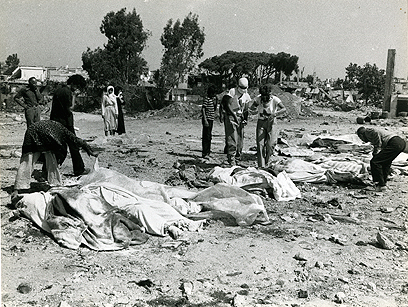
Minister in 1983: Mossad was disinformed on Sabra, Shatila
More records of cabinet meetings regarding massacre in Lebanon released, revealing accusations within Israeli intelligence, contradicting reports. 'How are we blamed while Mossad, which kept contact with Phalangists, isn't?' MI chief inquires
In presenting the commission's findings to the cabinet, then Justice Minister Moshe Nissim noted that the commission did not find Israel directly responsible for the massacre but that, according to the commission's report, Israel had indirect responsibility.
Related stories:
- Sharon in 1983: Israel could be accused of genocide
- MK: Gaza worse than Sabra and Shatila
- Sabra and Shatila Massacre
"We have no doubt that no conspiracy was concocted and no tie was created between someone from the Israeli ministerial or military staff and the Phalangists in order to execute such acts of horror," Nissim read to the cabinet from the commission report.
The massacre refers to the 1982 slaughter of between 762 and 3,500 Lebanese civilians in the Sabra and Shatila Palestinian refugee camps in Beirut by a Phalangist militia. Seeing as the massacre took place during Israel's war with Lebanon, IDF troops that had invaded Lebanon were in the vicinity of the camps when the slaughter took place, and were suspected of enabling the killings by allowing the Phalangist forces entrance into the refugee camps.

Victims of the 1983 massacre (Photo: Yossi Rott)
According to the commission's report, "The decision to let the Phalangists in (to the refugee camp) was made in order to prevent further IDF casualties, after hundreds died over a few months in Lebanon, and to comply to the cry of the Israeli public which resented the fact that Phalangists were benefitting from the war without taking part in it."
Indirect responsibility
Over the years, senior political and military officials have said that Israel's decision to allow the Phalangists into the camps was done without knowledge of the Phalangists' aim to slaughter the residents of the refugee camps. During the 1983 cabinet meeting, however, the justice minister nonetheless stressed that the commission, formally known as the Commission of Inquiry into the Events at the Refugee Camps in Beirut, pointed to Israel's indirect responsibility to the massacre.
Nissim proceeded to cite the report: "If it in fact turns out that those who decided to let the Phalangists in, could have – based on the information they had – predicted that there was a risk that a massacre would take place, but did not take any action to prevent the danger, that would mean that decision makers are indirectly responsible to what eventually happened, even if they did not mean it and were only trying to take their minds off impending danger… Fear that a massacre would occur should have eaten away at the heart of anyone who had any responsibility to the events in Lebanon."
The Phalangists' mass murders were later perceived as retaliatory acts for the assassination of Lebanese president Bachir Gemayel, and Israel was accused of enabling the massacre as its military intelligence and intelligence agencies were expected to have anticipated the vengeful acts.
Intelligence wars
The newly revealed records expose inner conflicts between intelligence officials. In one of the meetings, Interior Minister Yosef Burg asserted that "according to the commission's report… the prime minister wasn’t always informed of what he should have been informed, and if I'm reading this right, even the Mossad wasn’t always informed of important things."
"Who wasn’t informed?" Defense Minister Ariel Sharon insisted.
"The Mossad," Burg reiterated.
"Nahum (Admoni, director of the Mossad) wasn’t there (in meetings regarding the war); he was new to the position, but the head of Tevel (The Political Action and Liaison Department)? He was there all the time."
As a response, Minister Burg quoted from the report: "The Mossad chief noted that he had first become aware of letting the Phalangists into the camps only during the September 16 cabinet meeting, and now it appears that no information of the Phalangists' entrance into the camps was given to the Mossad, and that the Mossad chief was not aware of it."

IDF chief of staff during Lebanon War, Rafael Eitan (Photo: EPA)
The subject came up again, when in a different meeting, Sharon persisted: "Does anyone believe that… during the chief of staff's visit to the Phalangists' headquarters… no one of the Mossad's senior staff was present? Does anyone think that when I visited the command post… no senior Mossad officer was standing next to me? The Mossad was involved all along."
Director of Military Intelligence Yehoshua Saguy, however, had a different account of who was behind information withholding. According to the records, during the cabinet meeting in which Saguy was called in to address the report, the MI chief asked the cabinet: "How is it possible that we were the ones to blame? We, whose warnings and evaluations regarding the Phalangists were confirmed, while the Mossad, which was keeping contact with them and maintained a research system… sustained no damage?"
Then IDF Chief of Staff Rafael "Raful" Eitan also defended the IDF Intelligence Directorate, which was criticized in the report, insisting that the report was disregarding many other details. "What about the long war?" he asked the cabinet, "the preparations for the war? They (the commission) approach this system (Military Intelligence) and say: 'Of this you're accused.' But they're not putting it in the perspective of the entirety of the work that the Intelligence Directorate did in the war."
According to Defense Minister Sharon, Israel's military and intelligence systems were either misinformed or misinforming, but bore no blame: "I have no criticism of the Mossad. The Intelligence Directorate miscalculated the situation; the Mossad miscalculated the situation. None of us estimated that this would happen."
- Receive Ynetnews updates
directly to your desktop















